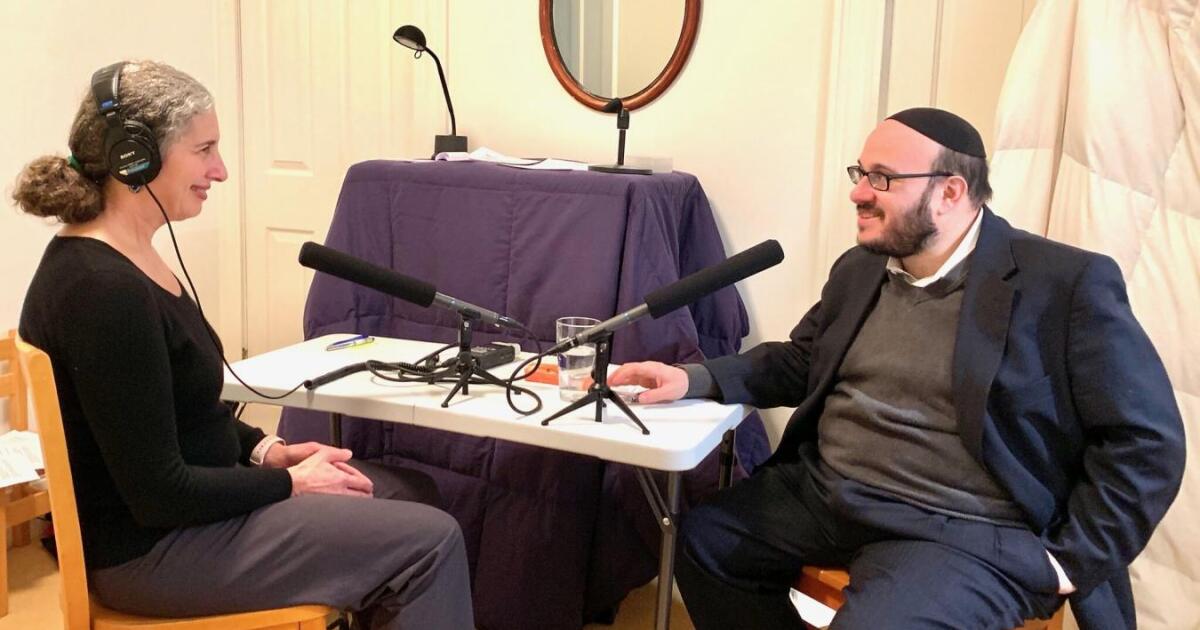Click “listen” above to hear an interview with podcast creators Aliza Becker and Noah Schoen, including clips from the podcast!
It’s been seven years since the synagogue shootings at Tree of Life in Squirrel Hill on Oct. 27, 2018, an attack that killed 11 people from three different congregations on Shabbat morning. And for all of those seven years, oral historians Aliza Becker and Noah Schoen have been trying to make sense of the attack through stories.
Over several years, Becker and Schoen have conducted more than 100 oral history interviews with Pittsburgh community members. The full collection is part of the “October 27 Archive,” which is a project of the Rauh Jewish Archives at the Heinz History Center. And this week, a selection of six of those interviews has been released as a new podcast, called “October 27th Podcast.”
The first season of the podcast “October 27th” was released October 26, 2025.
Becker and Schoen’s collaboration on the oral history project and the podcast began a few months after the shooting. But for Becker, a Chicagoan, the story begins the day of the shooting.
She heard the news about the synagogue shooting the day it happened through an emergency alert from the Israeli newspaper Haaretz. Even though she was in Chicago, she said the attack felt personal.
“It just felt like a gut punch,” Becker said. “It felt like it happened to me as a Jew.”
She was trained as an oral historian and she thought she could go to Pittsburgh to do an oral history of the Oct. 27 attack. But because she had spent very little time in Pittsburgh, she knew she needed to partner with a local.
She reached out to a friend in Pittsburgh’s Jewish community to see if her son, who was living in Boston but who had recently left his job, might be interested in helping.
That son who had recently left his job was Schoen.
Schoen grew up in Squirrel Hill six blocks from the Tree of Life synagogue. In the years leading up to the attack, he had begun thinking about the impact of antisemitism on Jewish people.
“One of the things I understood right away [after the shooting] was that something like this would be traumatic in and of itself for any people or community. But for Jewish people, there’s this extra layer … because antisemitism brings with it the threat not just of current violence, but of future violence,” said Schoen, who is now the manager of community engagement at the Holocaust Center of Pittsburgh. “When Aliza reached out to me … it just felt like … here’s an opportunity to really do something concrete.”
Meanings of October 27th project
Oral historians Aliza Becker (left) and Noah Schoen at the beginning of their oral history project about the 2018 Pittsburgh synagogue shootings.
The podcast includes interviews with survivors of the attack, like Audrey Glickman. Glickman grew up as an Orthodox Jewish kid in Pittsburgh’s Greenfield neighborhood, just south of Squirrel Hill. In her interview, she paints a complicated portrait of antisemitism she experienced as a child, where kids she knew “to be wonderful people” would parrot antisemitic things they had heard their parents say.
“What Audrey is inviting us to grapple with is … not all of antisemitism is a horrific, violent attack,” Schoen said. ”That’s one thing that we hope people will get from listening to these podcast episodes, is that it can spark conversations about these complexities and nuances.”
The archive includes many non-Jewish narrators, as well. Early in the project, Becker and Schoen did a listening tour, before they began recording interviews. One of the things they found was that nearly every Jewish Pittsburgher they spoke with during the listening tour had an anecdote about something a non-Jewish person had done for them, to comfort them in the aftermath of the shooting.
“We realized we needed to interview these non-Jews,” Schoen said. “This did not just affect the Jewish community. It actually affected every Pittsburgher.”
Because of the expansive approach they took — including Jewish and non-Jewish people, Pittsburghers and even a rural Christian high schooler — the archive and the podcast tell a rich and nuanced story.
“What we found is that this story has all kinds of ups and downs. All kinds of moments of pain and moments of comfort and hope and love,” Schoen said. “We wanted to create an archive that opened up the space to capture all of that.”
“October 27th Podcast” was released this week and the first six episodes are available wherever you get your podcasts. A new season is forthcoming in December. The full “Meanings of October 27th” archive of oral history interviews is available online.

